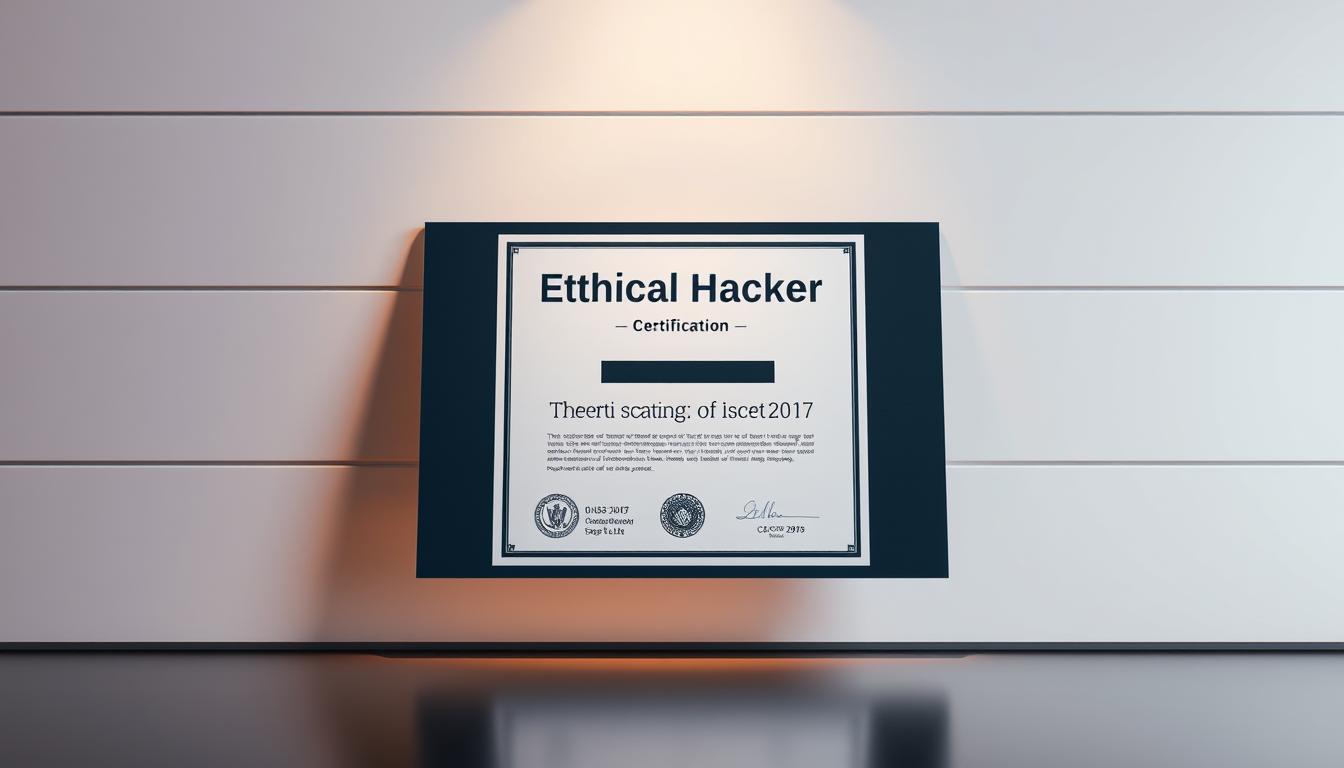In today’s digital age, cybersecurity has become a top priority for organizations of all sizes. With the increasing amount of data being stored online, the risk of cyberattacks is at an all-time high. As a result, companies are looking for IT security experts who can protect their networks from malicious hackers.
If you’re considering a career in information security, obtaining a Certified Ethical Hacker (CEH) certificate can be a great opportunity. The CEH is one of the most respected and well-known information security certifications globally, and it’s an excellent time to pursue it in 2024.
As you explore this guide, you’ll discover what makes the CEH certification one of the most sought-after credentials in the cybersecurity industry and how it can transform your career prospects.
Key Takeaways For CEH Certification Requirements :
- Understand the importance of CEH certification in the cybersecurity industry.
- Learn about the role of ethical hackers in protecting organizations from cyber threats.
- Discover how becoming certified can enhance your career prospects.
- Get an overview of the certification requirements and exam structure.
- Find out why staying updated with the latest CEH certification requirements is crucial.
Understanding the CEH Certification
In the realm of cybersecurity, the Certified Ethical Hacker (CEH) certification stands out as a highly respected qualification. As a cybersecurity professional, understanding what the CEH certification entails can be crucial for your career advancement.
What is a Certified Ethical Hacker?
A Certified Ethical Hacker, also known as a white hat hacker, is a cybersecurity specialist who uses their hacking skills for good. They identify and fix system vulnerabilities before malicious hackers can exploit them. In contrast, black hat hackers use their skills for nefarious purposes such as stealing data or disrupting services. There’s also a third category known as gray hat hackers, who use their skills for both good and bad purposes.
Key characteristics of ethical hackers include:
- Using hacking skills to improve security
- Operating within legal boundaries
- Identifying vulnerabilities to prevent cybercrimes
The Evolution of CEH Certification
The CEH certification has evolved significantly over the years to keep pace with the changing cybersecurity landscape. Initially focused on basic hacking techniques, it now covers a wide range of topics including cloud security, IoT security, and more. This evolution ensures that CEH certified professionals are equipped to handle modern cybersecurity challenges.
Why CEH Stands Out Among Cybersecurity Certifications
The CEH certification is unique due to its focus on offensive security techniques, providing a different perspective than defensive-oriented certifications. It’s globally recognized and respected by employers worldwide. The certification’s practical, hands-on nature prepares professionals for real-world security challenges, making it valuable for both entry-level and experienced security practitioners.
Some of the key benefits of CEH certification include:
- Global recognition
- Practical, hands-on training
- Valuable for career advancement
- Covers offensive security techniques
Benefits of Earning a CEH Certification in 2024
The CEH certification is more than just a credential; it’s a key to unlocking new opportunities in the cybersecurity landscape. As you consider advancing your career, understanding the benefits of this certification can help you make informed decisions.
Industry Recognition and Credibility
Earning a CEH certification validates your cybersecurity skills, making you a more attractive candidate to potential employers. When an employer sees that you have the CEH credential, they know that you have what it takes to protect their systems from malicious actors. This certification gives you an edge over other candidates, demonstrating your expertise and commitment to the field.
Career Advancement Opportunities
With a CEH certification, you can expect increased career advancement opportunities. Certified ethical hackers are in high demand, and this credential opens doors to new roles and responsibilities. According to the Bureau of Labor Statistics, the employment of information security analysts is projected to grow by 32% during this decade, indicating a strong job market for CEH certified professionals.
Salary Potential for CEH Certified Professionals
One of the significant benefits of earning a CEH certification is the potential for higher salary. Because the CEH credential is in high demand, employers are willing to pay a premium for certified ethical hackers. In fact, according to Payscale.com, the average salary for a CEH holder is $86,436 per year, with more experienced ethical hackers earning over $136,000 per year.
Fulfilling Department of Defense Requirements
The CEH certification is on the approved list for the U.S. Department of Defense (DoD) Directive 8570/8140, making it a valuable asset for those seeking careers in government and defense contracting. This approval opens doors to lucrative positions that specifically require the CEH credential. By combining the CEH with other DoD-approved certifications, you can maximize your employment opportunities in the federal sector.
Government agencies particularly value the ethical hacking skills validated by this certification for protecting critical infrastructure. As a result, CEH certified professionals are well-positioned to take advantage of these opportunities and advance their careers.
CEH Certification Requirements 2024: An Essential Guide

If you’re aiming to get certified as an ethical hacker in 2024, it’s essential to familiarize yourself with the certification requirements. The EC-Council has outlined specific eligibility criteria that candidates must meet to qualify for the CEH exam.
Official Training Path Requirements
One way to become eligible for the CEH certification is by enrolling in an official training program at a recognized educational institution. By doing so, you meet the CEH certification requirements without needing further verification of your background or experience.
For instance, institutions like MyComputerCareer offer CEH training courses that cover the necessary curriculum to prepare you for the exam. These programs ensure you’re well-versed in ethical hacking techniques and methodologies.
Experience-Based Eligibility Path
Alternatively, candidates can qualify for the CEH exam through their work experience in information security. To be eligible, you must have at least two years of experience in the field.
The process involves submitting an Eligibility Application Form to the EC-Council and paying a $100 eligibility fee. This path requires verification of your experience, so it’s crucial to document your roles and responsibilities accurately.
Educational Prerequisites
While specific educational prerequisites are not strictly mandated for the CEH certification, having a background in computer science, cybersecurity, or a related field can be beneficial.
Candidates with a strong educational foundation in these areas may find it easier to understand the complex concepts covered in the CEH exam.
Age and Other Requirements
To apply for the CEH certification, you must be at least 18 years old. Additionally, you’ll be required to agree to the EC-Council’s Code of Ethics, which outlines the professional conduct expected of certified individuals.
Maintaining a clean legal record is also important, as certain criminal convictions may impact your eligibility. For non-native English speakers, the EC-Council provides exam options in various languages to accommodate different needs.
As you prepare for the CEH certification, staying informed about any updates to the application process or eligibility criteria is vital. The EC-Council may introduce new requirements or changes to the certification process, so it’s a good idea to check their official website regularly.
The CEH v12 Exam Structure and Format
Understanding the structure and format of the CEH v12 exam is crucial for your preparation. The CEH v12 exam is a comprehensive assessment that evaluates your proficiency across various crucial information security domains.
Exam Code and Format
The CEH v12 exam has a specific code and format that you should be aware of. The exam is designed to test your knowledge and skills in ethical hacking and information security. The exam format is multiple-choice and multiple-response questions.
Duration and Number of Questions
The CEH v12 exam consists of a specific number of questions that you need to complete within a given duration. The exam typically includes 125 questions, and you have 4 hours to complete it.
Passing Score and Retake Policy
The passing score for the CEH v12 exam is not fixed and can vary based on several factors, including question difficulty and expert input. Typically, a score of 70% is considered passing, but it can range from 60% to 85% depending on the question bank used.
Key Domains and Topics Covered
The CEH v12 exam covers a wide range of domains and topics, including:
- Background (21.79%)
- Analysis/Assessment (12.73%)
- Security (23.73%)
- Tools/Systems/Programs (28.91%)
- Procedures/Methodology (8.77%)
- Regulation/Policy (1.90%)
- Ethics (2.17%)
The Tools/Systems/Programs domain represents the largest portion of the exam, highlighting the importance of practical tool knowledge in ethical hacking. The exam also includes new topics introduced in version 12, such as advanced cloud security, container security, and updated IoT hacking techniques.
By understanding the exam structure and content distribution, you can prioritize your study efforts and focus on the most critical areas.
Comprehensive Breakdown of CEH Exam Domains

As you prepare for the CEH certification, it’s essential to understand the various domains that the exam covers. The CEH exam is designed to assess your capacity to understand and apply fundamental principles of ethical hacking. The exam is divided into several key domains that test your knowledge and skills in critical areas of cybersecurity.
Information Security and Ethical Hacking Fundamentals
The CEH exam begins with the basics of information security and ethical hacking. You’ll need to understand the principles of ethical hacking, including the different types of hackers, the ethical hacking process, and the importance of staying within legal boundaries. Key concepts include threat modeling, attack vectors, and countermeasures.
Reconnaissance and Scanning Techniques
Reconnaissance and scanning are critical steps in the ethical hacking process. You’ll learn about various techniques used to gather information about a target network or system, including footprinting, scanning networks, and enumeration. Understanding these techniques is crucial for identifying potential vulnerabilities.
- Footprinting and reconnaissance techniques
- Scanning networks using various tools
- Enumeration techniques to gather detailed information
System Hacking and Vulnerability Analysis
System hacking involves exploiting vulnerabilities in systems to gain unauthorized access. You’ll need to understand how to perform vulnerability analysis, identify weaknesses, and exploit them using various tools and techniques. This domain also covers system hacking methodologies and countermeasures.
Network and Web Application Security
Network and web application security are critical areas of focus in the CEH exam. You’ll learn about network security threats, including sniffing, session hijacking, and denial-of-service attacks. Additionally, you’ll understand how to secure web applications against threats like SQL injection and cross-site scripting (XSS).
Mobile, IoT, and Cloud Security
The CEH exam also covers security related to mobile devices, IoT, and cloud computing. You’ll need to understand the unique security challenges associated with these technologies and how to mitigate potential threats. Key areas include mobile device security, IoT vulnerabilities, and cloud security best practices.
Cryptography and Social Engineering
Cryptography and social engineering are two critical domains in the CEH exam. You’ll learn about cryptographic principles and how encryption is used to protect systems. Additionally, you’ll understand the psychological principles behind social engineering and various techniques used to manipulate individuals into divulging sensitive information.
- Cryptographic principles and encryption techniques
- Common cryptographic attacks and testing methods
- Social engineering techniques, including phishing and pretexting
CEH Practical Exam: What You Need to Know

The Certified Ethical Hacker (Practical) exam is designed to test your hands-on skills in ethical hacking. This exam is an offshoot of the CEH certification and focuses on applying learned skills in real-world environments.
Differences Between CEH Theory and Practical Exams
The CEH theory exam tests your knowledge of ethical hacking concepts, while the Practical exam assesses your ability to apply these concepts in practical scenarios. The theory exam is multiple-choice, whereas the Practical exam involves completing real-world challenges within a given timeframe.
The Practical exam is a six-hour intensive test that evaluates your skills in various ethical hacking domains, including attack vector identification, network scanning, and system hacking.
Practical Exam Structure and Challenges
The CEH Practical exam features 20 real-world challenges that test your ability to identify and exploit vulnerabilities in different systems and networks. You’ll have access to various tools, operating systems, and applications to complete these challenges.
The exam environment is designed to simulate real-world scenarios, requiring you to demonstrate your penetration testing skills and ability to work under pressure. Effective time management is crucial to complete all challenges within the six-hour time frame.
By understanding the structure and challenges of the CEH Practical exam, you can better prepare yourself for the hands-on testing that lies ahead.
Preparing for the CEH Certification

Achieving CEH certification demands a well-structured preparation strategy that includes training, study materials, and hands-on practice. To help you prepare effectively, we’ll outline a step-by-step guide to creating a study plan, selecting the right training courses, and utilizing essential resources.
Creating an Effective Study Plan
To start, you need to create a study plan that is tailored to your learning style and schedule. Begin by assessing your current knowledge and identifying areas where you need improvement. Allocate sufficient time for studying and stick to your plan. A well-structured plan will help you stay focused and ensure that you cover all the necessary material before the exam.
Recommended Training Courses and Bootcamps
Selecting the right training course is crucial for your CEH preparation. Look for courses that offer a comprehensive introduction to ethical hacking, including the latest methodologies and techniques. Reputable training providers like EC-Council, Infosec Institute, and HackerU offer high-quality training programs. Ensure that the course is taught by experienced professionals with recognized certifications in ethical hacking.
Essential Study Materials and Resources
In addition to training courses, you’ll need to utilize various study materials and resources to prepare for the CEH exam. This includes textbooks, online tutorials, and practice exams. Some recommended study materials include the official EC-Council study guide and third-party books that cover the exam syllabus. Online platforms like Udemy, Coursera, and edX also offer relevant courses and tutorials.
Hands-on Practice Environments
Practice is a critical component of CEH preparation, especially if you’re aiming for the practical exam. You can gain hands-on experience by setting up a home lab using virtual machines or by using virtual lab environments like TryHackMe, Hack The Box, and VulnHub. These platforms offer realistic scenarios for honing your skills and mastering tools like Nmap, Metasploit, Wireshark, and various password cracking utilities.
Top Books and Resources for CEH Exam Preparation

Effective CEH exam preparation involves utilizing a combination of official study guides and third-party resources. To help you prepare, we’ve compiled a list of the most valuable materials available.
Official EC-Council Materials
The EC-Council provides official study materials for the CEH exam, which are a great starting point for your preparation. These materials are designed to cover all the necessary topics and provide a comprehensive understanding of ethical hacking concepts. You can find these resources on the EC-Council website or through authorized training providers.
Recommended Third-Party Books
In addition to official materials, several third-party books are highly recommended for CEH exam preparation. For example, the CEH v12 Certified Ethical Hacker Study Guide by R. Messier is a valuable resource that covers essential topics like reconnaissance, DoS attacks, and IoT security. It also includes 750 practice questions and electronic flashcards to help you fine-tune your preparations.
Another highly recommended book is the CEH Certified Ethical Hacker All-in-One Exam Guide by Matt Walker. This comprehensive guide covers all exam topics, including ethical hacking basics, cryptography, and system hacking. It features learning objectives, exam tips, and practice questions to help you prepare for the exam.
Online Platforms and Practice Tests
Online platforms and practice tests are also essential for CEH exam preparation. They provide hands-on experience and help you assess your knowledge and skills. You can find various online resources, including practice tests and virtual labs, to supplement your studying.
Free Resources and Communities
Several free resources and communities can aid in your CEH exam preparation. You can discover valuable free resources, including YouTube channels, blogs, and websites dedicated to ethical hacking topics. Online communities like Reddit’s r/CEH and various Discord servers can connect you with fellow certification candidates and provide a platform for discussion and knowledge sharing.
You can also leverage open-source tools and documentation to enhance your understanding of ethical hacking concepts. GitHub repositories containing CEH study materials and practice scenarios are another valuable resource. When using free resources, it’s essential to evaluate their quality and accuracy to ensure they’re providing reliable information.
CEH Certification Costs Breakdown

As you prepare for the CEH certification, it’s essential to consider the financial investment required. The costs associated with obtaining this certification can vary based on several factors, including training courses, study materials, and exam fees.
Exam Fees and Vouchers
The Certified Ethical Hacker (CEH) exam fee is $1,199, with a retake exam costing $450. If you opt for remote proctoring, an additional $100 is incurred. It’s crucial to budget for these costs in advance to ensure a seamless exam experience.
Exam Fee: $1,199
Retake Exam Fee: $450
Remote Proctoring Fee: $100
Training Course Expenses
Training courses are a significant component of CEH certification preparation. The costs of these courses can vary widely depending on the provider and the format (online or in-person). On average, you can expect to pay between $2,000 to $5,000 for a comprehensive training package.
Study Materials and Additional Costs
In addition to exam fees and training courses, you’ll need to budget for study materials and other resources. Official guides typically cost between $80-150, while third-party books range from $40-70 each. Online practice labs and test platforms usually charge subscription fees ranging from $30-100 per month.
Other potential costs include the $100 eligibility application fee for those pursuing the experience-based path. It’s essential to prioritize your spending based on the most critical resources for your study plan.
By understanding the total investment required for CEH certification, you can better plan your budget. The total cost typically ranges from $1,500 for self-study to $5,000+ for a full training package.
Exam Day Strategies for Success
To ace the CEH exam, you need more than just knowledge; you need a winning strategy. The CEH certification exam is a comprehensive test of your ethical hacking skills, and being prepared is crucial. In this section, we’ll cover essential strategies to help you succeed on exam day.
Time Management During the Exam
Effective time management is critical to completing the 125-question CEH exam successfully. You can try dividing the total exam duration by 125 to calculate the maximum time you can spend on each question. Start with a quick scan of the questions, answering the ones you’re confident about immediately. Flag complex questions for review and move on to avoid getting stuck. Leave some time at the end to review your answers and ensure you’ve addressed all flagged questions.
Approaching Multiple-Choice Questions
When approaching multiple-choice questions, read each question carefully and eliminate any obviously incorrect answers. Make an educated guess from the remaining options if you’re unsure. It’s also helpful to identify the keywords in the question and relate them to your knowledge of ethical hacking concepts.
Common Pitfalls to Avoid
Be aware of common pitfalls such as spending too much time on a single question or failing to manage your time effectively. Stay calm and focused, and avoid making careless mistakes. It’s also essential to understand the exam format and the types of questions asked.
What to Bring and Expect
On exam day, you’ll need to bring two forms of valid government-issued ID. Familiarize yourself with the testing center’s policies regarding electronic devices, personal items, and breaks. You’ll be provided with materials like scratch paper or whiteboards for notes. Understand the check-in procedures and what to expect in the testing environment to minimize stress and ensure a smooth experience.
The Certification Process After Passing

Congratulations on passing the CEH exam; now let’s explore the next steps. After successfully passing the CEH Certificate exam, the certification procedure ensures that you receive your well-deserved recognition promptly.
Receiving Your CEH Credential
Within seven business days, your hard-earned certificate will be sent to you. This CEH credential is a significant milestone in your career as an ethical hacker, signifying your expertise and commitment to cybersecurity.
Certification Validity and Renewal Requirements
The CEH certification is valid for three years from the date of certification. To maintain your certified status, you’ll need to comply with the EC-Council Continuing Education (ECE) program. Here are the key points to keep in mind:
- Earn 120 credits over the three-year period.
- Credits can be earned through various activities such as attending conferences, publishing articles, completing related courses, and participating in webinars.
- Renewal fees and process involve submitting your ECE credits through the EC-Council portal.
- Letting your certification lapse may require reinstatement, which has specific requirements.
Understanding these renewal requirements is crucial for maintaining your CEH certification and continuing your career as a certified ethical hacker.
Career Opportunities for CEH Certified Professionals

As a CEH certified professional, you’ll have access to numerous career paths that involve protecting organizations from cyber threats. The CEH certification is well-regarded across multiple industries, making it a valuable asset for those looking to advance their careers in cybersecurity.
In-Demand Roles for CEH Certificate Holders
With a CEH certification, you can explore various roles such as:
- Ethical Hacker: Detects and fixes security issues from an attacker’s perspective.
- Penetration Tester: Conducts systematic testing of systems for vulnerabilities.
- Security Consultant: Advises organizations on best practices for maintaining robust security.
- Cybersecurity Analyst: Monitors and protects networks from unauthorized access and attacks.
- Network Security Administrator: Manages and secures network infrastructure.
- Information Security Manager: Oversees an organization’s entire security posture.
- Social Engineering Expert: Specializes in protecting against tactics that exploit human psychology.
Industries Seeking Ethical Hackers
The CEH certification is valuable in sectors such as:
- Government agencies: Protecting sensitive information and infrastructure.
- Financial institutions: Safeguarding financial data and transactions.
- Technology companies: Securing software, hardware, and services.
- Consulting firms: Providing cybersecurity advice and services to clients.
Building a Career Path with CEH
To leverage your CEH certification for career advancement, consider:
- Complementing your CEH with additional certifications like OSCP, CISSP, or cloud security credentials.
- Gaining practical experience through entry-level positions, internships, or volunteer work with open-source projects.
- Building a professional network within the cybersecurity community through conferences, meetups, and online forums.
- Creating a compelling portfolio demonstrating your ethical hacking skills to potential employers.
By following these strategies, you can enhance your career prospects and increase your earning potential in the competitive cybersecurity job market.
CEH vs. Other Cybersecurity Certifications
As you consider advancing your cybersecurity career, understanding the differences between various certifications is crucial. The Certified Ethical Hacker (CEH) certification is a popular choice, but how does it compare to other prominent certifications in the field?
CEH vs. OSCP
The CEH and Offensive Security Certified Professional (OSCP) certifications both focus on penetration testing and ethical hacking. However, OSCP is considered more hands-on and challenging, with a greater emphasis on practical skills. While CEH covers a broader range of topics, OSCP is more specialized, making it a good choice for those who want to demonstrate advanced penetration testing skills.
CEH vs. CompTIA PenTest+
CompTIA PenTest+ is another certification that focuses on penetration testing, but it is more vendor-neutral than CEH. PenTest+ covers a wider range of topics, including risk management and vulnerability assessment. If you’re looking for a certification that demonstrates your overall cybersecurity skills, PenTest+ might be a better fit.
CEH vs. CISSP
The Certified Information Systems Security Professional (CISSP) certification is an advanced, managerial-level certification that covers a broad range of security topics. In contrast, CEH is more focused on technical ethical hacking skills. CISSP requires five years of professional experience, making it more suitable for senior security professionals. You can explore discussions on the value of CEH certification on platforms like Spiceworks, where professionals share their insights.
Ultimately, the choice between CEH and other certifications depends on your career goals and current experience level. By understanding the strengths and focuses of each certification, you can make an informed decision that aligns with your professional aspirations.
Conclusion About CEH Certification Requirements :
In the ever-evolving landscape of cybersecurity, the CEH certification stands out as a mark of excellence. As you’ve learned, this credential is not just a validation of your ethical hacking skills, but a key to unlocking new career opportunities.
Throughout this guide, you’ve gained a comprehensive understanding of the CEH certification requirements for 2024, from the fundamental concepts of ethical hacking to the detailed exam structure and preparation strategies. You’ve also seen how this certification can transform your cybersecurity career, equipping you with the skills needed to stay ahead in the field.
By obtaining your CEH certification, you’re not only enhancing your technical knowledge but also demonstrating your commitment to ethical practices and your ability to think like a hacker while maintaining professional integrity. As the cybersecurity landscape continues to evolve, the skills validated by the CEH certification will become increasingly valuable to organizations worldwide.
Now that you’re equipped with all the necessary information, you’re ready to make an informed decision about pursuing this certification and taking the next steps in your career. Remember, becoming a Certified Ethical Hacker is a significant investment in your future, one that can yield substantial returns in terms of career advancement, salary potential, and professional satisfaction.
